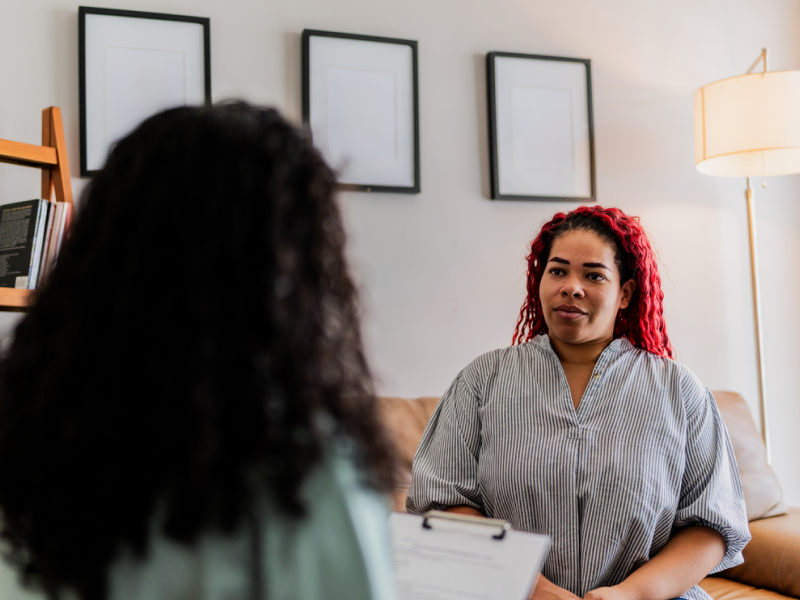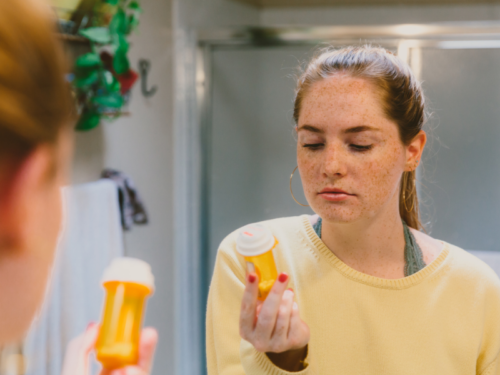
Table of Contents
Read This Before Taking Zoloft for OCD

Written By: Dr. Eli Muhrer, M.D.
June 14, 2024
7 min.
Should you take Zoloft for OCD? Read on to learn what a psychiatrist and team of psychiatric nurse practitioners think you should know about using this antidepressant as an OCD treatment.
Learn more about our Clinical Review Process
Table of Contents
For many people with obsessive-compulsive disorder (OCD), medication can provide significant relief from the anxiety and distress associated with obsessions and compulsions. If you’re considering medication for OCD, you might be curious about the drug Zoloft, the brand name for sertraline. You may have heard of Zoloft as a treatment for depression, but it can also be used to treat OCD. So, how is OCD treated with Zoloft? Read on to learn more about how Zoloft works, how long it takes to kick in, side effects, and other treatment options for OCD.

Begin virtual therapy and medication management today
Fill out our quick form below to learn if Charlie Health is right for you.
Can you take Zoloft for OCD?
In short, yes. Zoloft (sertraline) is commonly prescribed for OCD. The FDA has approved Zoloft for the treatment of OCD in children and adolescents ages 6 to 17 and adults 18 and over. Also, clinical and various research studies have shown the safety and efficacy of Zoloft in kids, teens, and adults.
And, since it’s very common for OCD to co-occur alongside other mental health conditions, Zoloft can help relieve multiple mental health symptoms at once, says Rebecca Holland, PMHNP-BC, a Charlie Health Psychiatric Mental Health Nurse Practitioner. Data shows that about 41% of people with OCD have depression, and 76% have an anxiety disorder. So, if someone struggles with comorbid mental health diagnoses such as anxiety disorders or depression, Zoloft can help relieve these symptoms. Also, when you reduce the symptoms of not only OCD but also other co-occurring disorders, you’ll notice a big difference in your mental health overall.
How does Zoloft work?
Zoloft is a selective serotonin reuptake inhibitor (SSRI). SSRIs specifically impact serotonin, a neurotransmitter, in the brain. Serotonin plays a role in mood and anxiety. Imbalances of neurotransmitters and low serotonin levels are theorized to be related to mental health conditions.
SSRIs work by inhibiting the reuptake of serotonin, which increases the availability of serotonin in the brain, says Claire Streeter, PMHNP, ARNP, a Psychiatric Mental Health Nurse Practitioner with Charlie Health. The extra serotonin that is available then improves communication between nerves in your brain. The exact reason why SSRIs like Zoloft help OCD is unknown, but research has proven the drug to be effective in reducing OCD symptoms in many people.
How long does Zoloft take to work?
SSRIs such as sertraline don’t work immediately. When you first start taking Zoloft, you only take a small dose. In the case of pediatric OCD, the starting dose for children is 25 mg daily. The starting dose for teens and adults over 13 is 50 mg daily. Then, your provider will have you slowly increase the dose based on your response to the medication and their recommended schedule. The maximum Federal Drug Administration (FDA) dose is 200 mg daily.
Once you reach a therapeutic dose, it can take six to eight weeks to see the full results of the medication, says Streeter. As time goes on, be on the lookout for signs that Zoloft is helping your OCD symptoms. Streeter says some positive signs include:
- Reduced intrusive thoughts and worries
- Improved ability to resist engaging in compulsive behaviors
- Fewer overall urges to engage in compulsions
- Overall, less frequent or intense anxiety related to obsessions and compulsions
- Improvement in quality of life.
If it’s been six to eight weeks and you aren’t feeling any improvements, let your provider know.
What are the side effects of taking Zoloft for OCD?
Common side effects of taking Zoloft for OCD
Rare but serious side effects of taking Zoloft for OCD
Nausea, diarrhea, indigestion, drowsiness, insomnia, loss of appetite, excess sweating, anxiety, agitation, sexual dysfunction, tremors
- Serotonin syndrome: A condition when you have dangerously high levels of serotonin, with symptoms ranging from mild (dilated pupils, fast heart rate, sweating, diarrhea) to severe (fever, tremors, seizures, unconsciousness), especially if combined with other serotonin-impacting medications.
- Black box warning: Lexapro carries a “black box warning” for potential worsening depression, suicidal thoughts, and behavior changes, particularly in individuals under 24 years old.
Zoloft comes with the risk of adverse effects. In most cases, these side effects are mild, and they will subside as your body acclimates to the medication. Common side effects of Zoloft include:
- Nausea, diarrhea, indigestion
- Drowsiness or insomnia
- Loss of appetite
- Excess sweating
- Tremors
- Anxiety
- Agitation
- Sexual dysfunction
Additionally, there are some specific Zoloft side effects to look out for in kids and teens, including:
- Agitation
- Abnormal muscle movements
- Nose bleeds
- Aggression
- Changes to weight
- Slow growth rate
- Urinary incontinence (leaking urine)
If you have any side effects from Zoloft, report them to your doctor. If the side effects are not tolerable, you might have to reduce the dose or switch to a different medication. However, you should never change your dose or stop taking Zoloft unless your prescriber specifically tells you to do so.
Rare but serious side effects of taking Zoloft for OCD
When taking Zoloft for OCD, there is also the possibility for some rare, more serious side effects — which are a concern when taking any SSRI, not just sertraline. They include the following:
Serotonin syndrome
This is a complication when you have dangerously high serotonin levels. If you do not seek medical attention, it can become fatal. You may experience mild symptoms such as diarrhea, sweating, fast heart rate, or dilated pupils. Or, you may have severe symptoms like fever, seizures, or unconsciousness. The risk of serotonin syndrome is higher if you take any other meds that impact serotonin on top of sertraline. If you have any of these signs, contact a medical professional immediately.
Black box warning
Zoloft has a “black box warning” for potential worsening depression or resulting in suicidal thoughts. If you have any suicidal thoughts or behavior changes, tell your provider right away. This risk is higher in people under 24 years old.

Before you start taking Zoloft, make sure you discuss all drug information, including any concerns about side effects and risks, with your provider. Additionally, you should inform your provider about all medications or supplements you currently take. This way, they can check for any dangerous medication interactions, ensuring that Zoloft is safe for you to take. If a risky drug interaction does exist, your prescriber may opt to prescribe you a different drug.
What are other OCD treatment options?
If you and your prescriber decide sertraline isn’t the best fit for you, there are many other treatment options to improve your OCD symptoms. Also, medication for OCD is shown to be most effective when taken in tandem with therapy. Here are some OCD treatment options other than Zoloft:
Medication for OCD
The main first-line medical treatment for OCD is using an antidepressant. SSRIs are the most commonly used antidepressants for OCD.
SSRIs that are FDA-approved for OCD treatment are:
- Lexapro: (generic: escitalopram)
- Luvox (generic: fluvoxamine)
- Paxil (generic: paroxetine)
- Prozac (generic: fluoxetine)
Additionally, there is an older type of antidepressant known as tricyclic antidepressants (TCAs). Anafranil (brand name for clomipramine) is an FDA-approved OCD medication that can be effective for people who haven’t responded to SSRIs, Holland says. However, due to a higher risk of side effects, TCAs, in general, aren’t as commonly used as SSRIs.
Therapy for OCD
Therapy is essential for managing OCD, Holland says. According to the American Psychiatric Association, a combination of therapy and medication is the most effective way to treat severe OCD. In therapy, you can learn effective skills to manage obsessions and intrusive thoughts and resist compulsive behaviors. Three types of therapy that are popular for OCD treatment are as follows:
Exposure and response prevention (ERP)
ERP is extremely effective at treating OCD symptoms. Your ERP therapist will help you gradually expose yourself to thoughts or situations that trigger your obsessions. Then, you sit with the discomfort and resist performing the compulsion that you typically engage in to reduce your anxiety. Over time, ERP helps you become desensitized to these fears, while also decreasing your urge to perform compulsions.
Cognitive behavioral therapy (CBT)
CBT helps you identify unhealthy, negative thought patterns and behaviors. You will learn how to analyze and challenge distorted thoughts and create healthier new ones. You will also learn various coping skills to manage your anxiety and any other difficult emotions that pop up.
Acceptance and commitment therapy (ACT)
ACT is a unique type of therapy that involves practicing acceptance rather than fighting against or avoiding difficult emotions or thoughts. An ACT therapist will teach you to tolerate OCD symptoms, such as intrusive thoughts, as a part of the human experience and mindfully detach from your thoughts.

OCD treatment and medication management at Charlie Health
If you or a loved one are struggling with OCD, Charlie Health is here to help. Our virtual Intensive Outpatient Program (IOP) provides more than once-weekly mental health treatment for teens, young adults, and families dealing with complex mental health conditions, including severe OCD and other conditions such as generalized anxiety disorder, panic disorder, social anxiety disorder, major depressive disorder, bipolar disorder, and more.
Our expert clinicians incorporate evidence-based therapies into individual counseling, family therapy, and group sessions. We also offer medication management to clients as needed for those who could benefit from psychiatric medications on top of therapy. With this kind of holistic treatment, OCD recovery is within reach. Fill out the form below or give us a call to start healing today.




